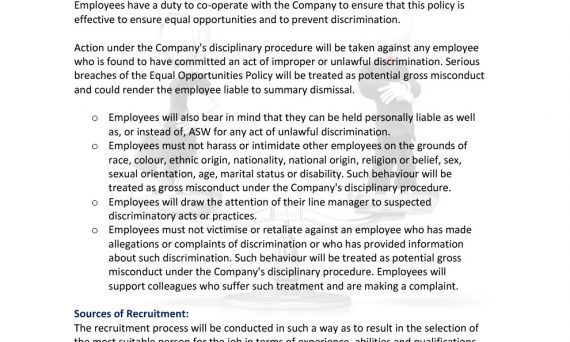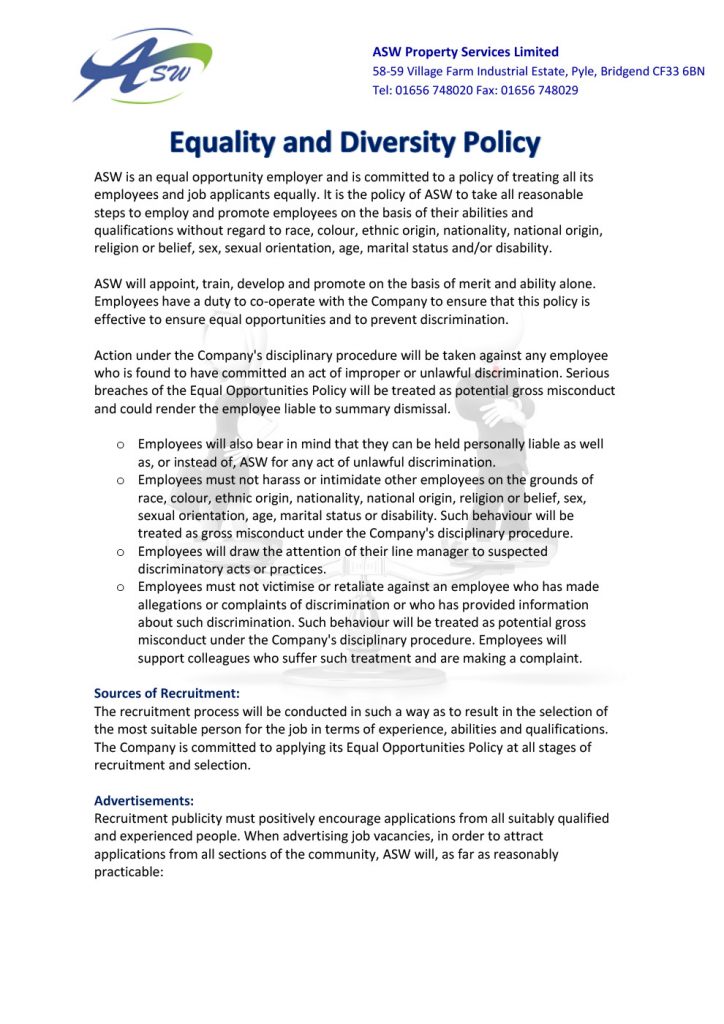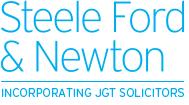Steele Ford & Newton Equality and Diversity Policy – 1 Our commitment to equality and diversity
(a) Commitment
We Steele Ford & Newton Solicitors are committed to eliminating unlawful discrimination and to promoting equality and diversity within our policies, practices and procedures. We are also committed to promoting equality and diversity. This applies to our professional dealings with clients, staff and partners, other solicitors, barristers, and third parties.
We shall treat everyone equally and with the same attention, courtesy and respect regardless of:
(a) age;
(b) disability;
(c) gender reassignment;
(d) race;
(e) religion or belief;
(f) sex;
(g) sexual orientation;
(h) marriage or civil partnership status;.
(i) pregnancy and maternity or;
(j) caring responsibility.
(b) Legislation
We will take all reasonable steps to ensure that we and our staff do not unlawfully discriminate under the terms of the Contracts and any legislation in force from time to time relating to discrimination in employment and the provision of goods, facilities or services.
2 Meeting Clients Needs
(a) General statement
As a provider of publicly and privately funded legal services we will treat all clients equally and fairly and not unlawfully discriminate against them. The firm will also, wherever possible, take steps to promote equal opportunity in relation to access to the legal services that we provide, taking account of the diversity of the communities that we serve.
(b) Identifying clients needs
We are committed to meeting the diverse needs of clients. We will take steps to identify the needs of clients in our community and develop policies and procedures setting out how we will meet clients? needs and for entering the services we provide are accessible to all. We will take account, in particular, the needs of clients with a disability and clients who are unable to communicate effectively in English. We will consider whether particular groups are predominant within our client base and devise appropriate policies to meet their needs: including men and women; carers; children; the elderly; members of religious groups; ethnic groups or nationalities; and lesbian, gay or transgender people.
(c) Communications Plan
We will devise policies and procedures to promote and raise awareness of policies and procedures for ensuring that our services are accessible for a diverse range of clients. Our communications plan sets out what steps we have taken or/ and will take to put in place customer service policies and procedures to make our services accessible to clients. It contains a list of policies and procedures; information about what steps we will take to put them in place; who is responsible for them; and how we will make our policies and procedures openly available for the public.
Employees and partners will be informed of the Communications Plan and training provided where appropriate to ensure that it is effectively implemented. The Communications Plan can be seen at our Nelson office.
3. Dealings with third parties
(a) General statement
The firm will not unlawfully discriminate in dealings with third parties. This applies to dealings with other legal service providers and general procurement.
(b) Dealings with barristers
The firm will instruct barristers on the basis of their skill, experience and ability and not unlawfully discriminate, or encourage barristers’ clerks to unlawfully discriminate on the grounds of their age; gender; marital status; race; religion or belief; sexual orientation or on the grounds of disability.
4. Employment
(a) General statement
As an employer, the firm will treat all employees and job applicants equally and fairly and not unlawfully discriminate against them. This applies equally to voluntary positions and anyone undertaking work experience with us. This will, for example, include arrangements for recruitment and selection, terms and conditions of employment, access to training opportunities, access to promotion and transfers, grievance and disciplinary processes, demotions, selection for redundancies, dress code, references, bonus schemes, work allocation and any other employment related activities.
(b) Recruitment and selection
This firm recognises the benefits of having a diverse workforce and will take steps to ensure that:
- we endeavor to recruit from the widest pool of qualified candidates practicable;
- employment opportunities are open and accessible to all on the basis of their individual qualities and personal merit;
- where appropriate, positive action measures are taken to attract applications from all sections of society and especially from those groups which are underrepresented in the workforce;
- selection criteria and processes do not unlawfully discriminate on the grounds of sex (including marital status, gender reassignment, pregnancy, maternity and paternity), sexual orientation (including civil partnership status), religion or belief, age or disability; other than in those instances where the firm is exercising permitted positive action or a permitted exemption;
- wherever appropriate and necessary, lawful exemptions (genuine occupational requirements) will be used to recruit suitable staff to meet the special needs of particular groups;
- all recruitment agencies acting for the firm are aware of requirements not to discriminate and to act accordingly.
(c) Conditions of service
The firm will treat all employees equally and create a working environment which is free from unlawful discrimination and which respects the diverse backgrounds and beliefs of employees. Terms and conditions of service for employees will comply with anti-discrimination legislation. The provision of benefits such as flexible working hours, maternity and other leave arrangements, performance appraisal systems, dress code, bonus schemes and any other conditions of employment will not unlawfully discriminate against any employee on the grounds of their age; gender and gender reassignment; marital status; race; religion or belief; sexual orientation or on the grounds of disability.
Where appropriate and necessary, the firm will endeavour to provide appropriate facilities and conditions of service which take into account the specific needs of employees which arise from their ethnic or cultural background; gender and gender reassignment; responsibilities as carers; disability; religion or belief or sexual orientation.
(d) Promotion and career development
Promotion within the firm including to partners will be made without reference to any of the forbidden grounds and will be based solely on merit. The selection criteria and processes for recruitment and promotion will be kept under review to ensure that there is no unjustifiably discriminatory impact on any particular group.
While positive action measures may be taken in accordance with relevant anti-discrimination legislation to encourage applications from under-represented groups, appointments to all jobs will be based solely on merit. All employees will have equal access to training and other career development opportunities appropriate to their experience and abilities. However, the firm will take appropriate positive action measures (as permitted by the anti-discrimination legislation) to provide special training and support for groups which are under- represented in the workforce and encourage them to take up training and career development opportunities.
(e) Training Plan
The firm will identify equality and diversity training needs and draw up a plan to address these as appropriate to their responsibilities. The plan will include details of the sort of training that will be provided, who will be trained, when training will be provided and who is responsible in the firm for ensuring that training is delivered. Employees and partners will be informed of this equality and diversity policy and training plan. The Training Plan can be viewed at our Nelson office.
(f) Working with other organisations
All those who act on the firm’s behalf will be informed of this equality and diversity policy and will be expected to pay due regard to it when conducting business. In all its dealings, including those with any consortium members the firm will seek to promote the principles of equality and diversity.
5. Implementing the policy
(a) Responsibility
Ultimate responsibility for implementing the policy rests with the firm. The partners have appointed Nick Cassidy, Partner to be responsible for the operation of the policy. All employees and partners of the firm are expected to pay due regard to the provisions of this policy and are responsible for ensuring compliance with it when undertaking their jobs or representing the firm.
Acts of unlawful discrimination on any of the forbidden grounds by employees or partners of the will result in disciplinary action. Failure to comply with this policy will be treated in a similar fashion. The policy applies to all who are employed in the firm and to all partners.
Acts of unlawful discrimination on any of the forbidden grounds by those acting on behalf of the firm will lead to appropriate action by the Legal Services Commission.
(b) Complaints of discrimination
The firm will treat seriously all complaints of unlawful discrimination on any of the forbidden grounds made by employees, partners, clients, barristers or other third parties and will take action where appropriate.
All complaints will be investigated in accordance with the firm’s grievance or complaints procedure and the complainant will be informed of the outcome. We will also monitor the number and outcome of complaints of discrimination made by staff, clients, partners, barristers, and other third parties.
(c) Monitoring
(1) The firm will monitor and record equal opportunities information about staff, partners on the basis of age, gender, ethnicity, and disability.
(2) Where it is possible to do so, and where doing so will not cause offence or discomfort to those whom it is intended to protect, we will monitor the sexual orientation and religion or belief of staff, partners so as to ensure that they are not being discriminated against in terms of the opportunities or benefits available to them. We are aware that individuals may choose not to disclose their sexual orientation or religion or belief and that care will be taken to avoid inadvertent discrimination in such cases.
We will store equal opportunities data as confidential personal data and restrict access to this information. Equal opportunities information will be used for exclusively for the purposes of equal opportunities monitoring and have no bearing on opportunities or benefits.
The firm will monitor all elements of:
- recruitment and selection process (applicants and existing staff and partners);
- promotion and transfer;
- training (all training opportunities not restricted to equality and diversity training);
- terms and conditions of employment;
- take up of benefits (work life balance policies e.g. flexible working requests)
- grievance and disciplinary procedures;
- resignations, redundancies, and dismissals.
The firm will provide equal opportunities information to the Legal Services Commission as required in relation to personnel and clients under the terms of the LSC Contracts.
(d) Review
The firm will review the operation of this policy not less than twice a year (or more regularly if we identify any non-compliance or problem concerning equality and diversity issues with clients or personnel).
We will take remedial action if we discover non-compliance under this policy or barriers to equal opportunities. When reviewing the policy we will consider the outcome of monitoring and review actions under our communications and training plans.…


























































